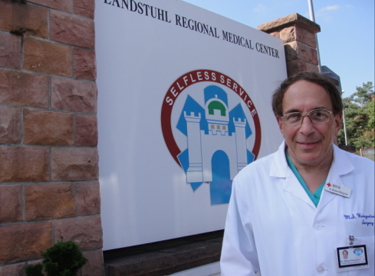
Dr. Michael S. Weingarten, professor and chief of vascular surgery and director of the wound healing program at Drexel University College of Medicine, recently returned from his third volunteer trip abroad treating severely wounded combat troops at Landstuhl Regional Medical Center (LRMC) in Germany, the largest American hospital outside the United States.
Weingarten was there for two weeks and has made this trip twice before in recent years. He went as part of the Combat Casualty Program, which was established by the Society of Vascular Surgeons and the American Red Cross to combat the shortage of vascular surgeons, not only at Landstuhl, but throughout the military.
Combat casualties in Iraq and Afghanistan are first taken by helicopter to forward surgical hospitals for damage control surgery. They then are transported to Combat Support Hospitals in either Afghanistan or Iraq where more definitive care is given. The injured then are placed on Critical Care Air Transport flights which fly at night from Iraq or Afghanistan and arrive at LRMC.
The majority of injuries Weingarten and his team took care of at LRMC were severe head injuries or devastating injuries to the lower limbs and the pelvis. Most of the combat injuries on this particular trip were from Afghanistan.
"The signature injury we saw this time consisted of bilateral traumatic above the knee amputations associated with blast injuries to the pelvis and its contents. Most of the soldiers were wounded by improvised explosive devices (IEDs)," said Weingarten."The soldiers we cared for included American troops, as well as soldiers from the coalition forces serving in Afghanistan."
Weingarten also treated civilian contractors who had been injured "down range," a term used by the military to describe combat zones – now mostly Afghanistan. The injured were re-operated on at LRMC as needed, stabilized, and then flown to the United States for continued care.
"These brave young men and women face long months if not years ahead healing their wounds and re-integrating into society. I was honored to be able to contribute my skills as part of the expert team caring for these patients," added Weingarten.
And although the patients left Landstuhl quickly to return to the United States, their surgeons in Germany would continue to communicate via videoconference with physicians at the U.S. medical centers taking them in, just as they had with the surgical teams in Afghanistan and Iraq. "There was total continuity of care from the forward surgical teams on the battlefield to the hospitals in the U.S.," said Weingarten.